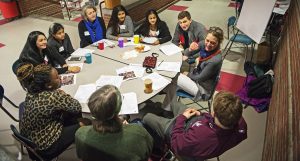Guest post by Michele Holt-Shannon of New Hampshire Public Radio special to FSNE for the 21-Day Racial Equity Habit-Building Challenge
 We Need to Talk
We Need to Talk
I sat on a C & J bus heading back from Logan Airport after a four-day racial equity institute outside Chicago. My laptop open, I scrolled through my work emails thinking about the week ahead. As I opened one of those emails, my heart began to race.
We need to talk.
I felt that feeling in my stomach, the familiar one that tells me I was about to face something – a feeling I had at the institute. A few days earlier I sent out a newsletter announcing a work

NH Listens / Concord
shop on intergenerational equity. It was creatively designed based on the blockbuster film The Black Panther. The title of the workshop was Wakanda Forever! My colleague, a highly respected leader in the field of race and equity, a Black woman, had received the invitation and reached out with concern – Was this cultural appropriation? I knew her question was an important one. I needed to figure this out as a white woman focused on race and equity myself.
Sagacity Walker, a Black man, a Marvel Comics fan, and a respected community engagement analyst with Everyday Democracy, designed and led the intergenerational equity workshop. In the public announcements and flyers shared about the training, I did not make clear Mr. Walker’s identity and professional background. I have to admit, I did not even think about including the information. I continue to be grateful to my colleague who reminded me of the importance of contextualizing equity work in ways that value and honor the full identities of those involved.
Sagacity and I had the chance to talk to each other before the workshop, not just about the use of the movie, but also the use by the movie creators, of Wakanda, an indigenous North American concept. In the movie, Wakanda is a fictional country in sub-Saharan Africa that has never been colonized. The conversation opened my awareness to the layering of cultural appropriation to which I had piled on. It was also clearer to me the problematic nature of analyzing colonization as a white woman.
I value our country’s aspirational story of freedom, opportunity and justice for all. I also believe that many people have been historically disadvantaged in that story. Race is a story we were all told. Racism, however, is a story we need to hear and understand over and over. I am a white woman who has lived and worked in New Hampshire for almost 30 years. I know the images that come to mind – snowcapped mountains, maple syrup, foliage in autumn, and white people. People inside and outside New Hampshire very commonly refer to it as all white, which is untrue and harmful.
When we say New Hampshire is an all-white state, thousands of People of Color are erased and marginalized further. New Hampshire is not and never has been all white, as we know. We need to address racism no matter the racial make-up of our organizations and communities. There are deep inequities we need to tackle together. I am part of a community in New Hampshire that is actively working toward building relationships, where People of Color and white people are working on being in community together, where not just diversity but true inclusion is welcomed, wanted and growing. That one reason I was lucky to receive that email.
I continue to increase my awareness and understanding about race-based oppressions buried deeply in the fabric of our country and our communities. It requires a habit of continued learning and vulnerability. I am building that habit, including increasing my comfort with the mistakes I will inevitably make. I see progress in myself, while knowing I still have a long way to go. I know I will always need friends and colleagues to help me to see things I do not see on my own. I value and rely upon the questions and conversations to challenge my thinking and to grow.
That email I got? It was sent with care and hope. My first feeling was a familiar sinking one, but my second and lasting feeling is one of deep gratitude for her openness and honesty with me.
Michele Holt-Shannon lives in Dover New Hampshire with her family, awesome neighbors, and her dog Archie whose job it is to walk her every day. She is the Director and co-founder of New Hampshire Listens at the Carsey School of Public Policy at the University of New Hampshire.
Resources we love:
Endowment for Health Race and Equity in New Hampshire Series
Tools/pdfs of racial identity and white identity timelines




